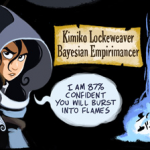While googling to nail down some of Javert’s lyrics, I ended up on his IMDB quotes page, which draws on film adaptations of the book going back to 1935. And, looking over these selections, it’s clear a number of productions have seen Javert as some kind of atheist, possibly of an existentialist stripe. One movie has him saying, “There is no God. There is only the law. Good and evil do not exist outside the law.”
But the Javert of the book and the musical isn’t a heathen; he’s a heretic. (Probably a Pelagian). Let’s watch another performance of “Stars.”
http://www.youtube.com/watch?v=fB1OgS0MuBsJavert loves God, in his own way, because Divine Law is the source of order in the world. For Javert, the absense of mercy is the greatest mercy of all, because it allows Javert to perfectly understand the world around him. Grace is a miracle, a dirty word, a motion to suspend the rules.
A long time ago, I was trying to work through Michael Egnor’s Eight Questions for Atheists, and I was kind of non-plussed by question number three: Why is there regularity/law in nature? We can’t imagine irregularity in nature; if we lived in that kind of world (I suggested it might look like a badly written sci-fi or fantasy novel), we wouldn’t be able to ask ‘why’ questions at all, since causality would be beyond us.
In a similar way, every miracle strikes a little at our ability to make sense of the world. If God suspends physics to save us from physical harm (be it paper cut or landslide), soon enough there’s not enough physics left for us to understand and try to formalize. And that’s the maelstrom that Javert fears.
Mercy unmoors the moral stars Javert navigates by, and, as an agent of the Law, he needs some kind of unfailing light to steer by. The more precisely he understands the world, the less margin for error he needs to leave. But, if God can break the rule that, if Lucifer falls, he will be in flame, how can Javert trust that the promise to the righteous will be kept? Perhaps he lacks faith in God’s goodness, but I think he’s also afraid he’d have to give up a little faith in Javert.
After all, if the moral universe is as mechanical as Javert dreams, he can save himself through his own efforts. If the rules are fixed and known, then all he has to do is follow them. If there are no miracles and no mercy, then everything is within Javert’s understanding, and his mastery is only limited by his self-control. God sets the rules, and Javert gets to play a fair game.
And, once again, I feel the pull of Javert’s temptation. I want to be able to control what happens. When I do good, I want to know exactly how much of the credit accrues to me (and I want it to be a lot). I like setting up all the parts of a plan and watching them fall click, click, click into place. And I’m pretty good at it.
So, the stakes have to be pretty high, before I actually want to achieve a goal more than I want to have personally been of use in pulling it off.
And mercy is unearned and unexpected. It’s not a loophole that I’m exploiting by my cleverness or some kind of arcana that I discovered through diligent study. It’s available to everyone, free for the asking, even if they’re not as fast and tough as I am. It’s not something I can excel at.
To accept a world of mecy, Javert and I have to be willing to be better than we can be on our own efforts, and we’re frightened that that concession taints every victory we’ve won up to this point. Better to lose than to cheat.
But if Javert can admit that he can’t make himself whole by himself, then he can recognize his equality with Valjean. It doesn’t matter how far each of them has fallen; only that each man cannot reach the summit on his own efforts. Each is guilty for all and before all, and each can receive forgiveness from each other and from God.












